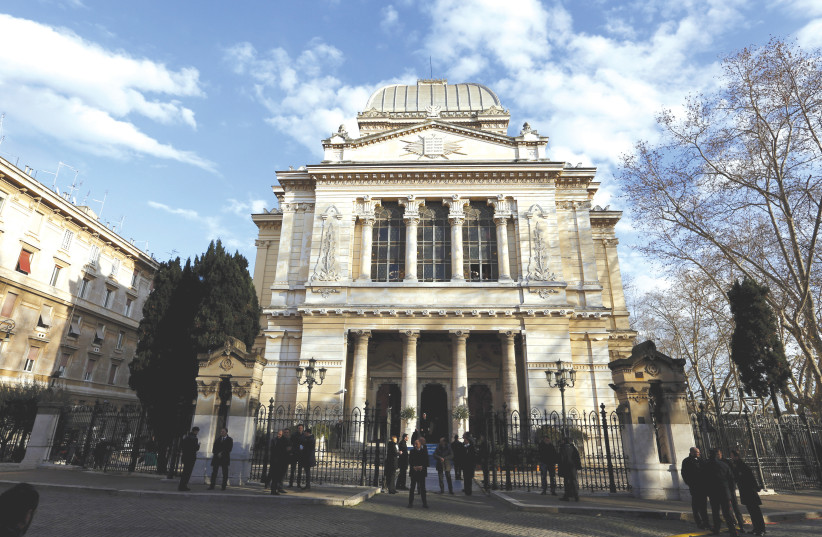- After the destruction of the Temple in Jerusalem, Emperor Vespasian redirected the monies from the tax on Jews collected throughout the empire, which had been used for the Temple’s upkeep, to support a temple to Jupiter in Rome.
- In ancient Rome, Jews were sometimes charged with being atheists – not because they didn’t believe in God but because they refused to venerate Roman emperors as deities.
- Of the 1,020 Roman Jews who arrived at Auschwitz after the first Nazi roundup in 1943, 16 survived the war.
- There were 11 synagogues in Rome from the second to the fourth centuries CE; today, almost two millennia later, there are 18.
These are a few of the facts that enrich this tale of a sometimes happy, often sad relationship between the 2,000-plus-year-old Roman Jewish community and its non-Jewish neighbors – particularly Catholics.
The theme of Intimate Strangers is that from the beginning, Roman non-Jews recognized Roman Jews as familiar, as almost family members, but with the accent on the “almost.”
In ancient Rome, Jews already were “intimate strangers,” writes author Fredric Brandfon. “Even when Jews were accepted, including as citizens in ancient Rome, they still were strangers. Their most prominent customs – circumcision, Sabbath observance, and the prohibition against eating pork – were not considered quaint or exotically mysterious; more often, they were cause for jokes.”
“Even when Jews were accepted, including as citizens in ancient Rome, they still were strangers. Their most prominent customs – circumcision, Sabbath observance, and the prohibition against eating pork – were not considered quaint or exotically mysterious; more often, they were cause for jokes.”
Fredric Brandfon
This strange relationship continued into modern times. During the Holocaust, many priests, nuns and ordinary Romans risked their lives to help Jews. “The outpouring of Catholic charity toward Jews during the Nazi occupation confirms the understanding that Jews and Catholics in Rome often perceived themselves in familial terms. … [Once again] there were times when Jews were made to feel part of a larger Roman family and times when they were not, producing the paradox, the cognitive dissonance, of living as intimate strangers.”

The history of Roman Jews
The 16th century was a particularly dark time for Roman Jews, when they were forced to live in a ghetto and had to listen to conversionary sermons delivered in their synagogues.
In the 19th century, the forcible removal of Jewish children from their parents so they could be raised Catholic became all too frequent, despite the prohibition against such behavior in Catholic doctrine.
One pregnant Jewish woman agreed to convert herself and her baby once it was born but changed her mind. She was kidnapped and kept in a Catechumeni, a building that housed candidates for baptism, until her child was born. Once born, the child was baptized on the pretext that her life was in danger and therefore her soul had to be saved. The mother then converted to stay with her child.
Reactions to a similar, scandalous case reverberated around the world.
In 1858, a Catholic teenage servant, Anna Morisi, baptized Edgardo Mortara in Bologna, a city in the Papal States, when the young boy was ill, and she thought he would die without the “church’s comfort.” The boy recovered, and the young woman left the Mortara’s employ. She told the story of the baptism to another servant, who informed the Inquisition. After questioning Morisi, policemen came to the Mortara home and took the child away.
The Mortaras protested vehemently but with no success. Pope Pius IX ruled that the boy was a Catholic and, as such, could not be returned to his Jewish parents.
“The pope was assailed in newspapers worldwide,” Brandfon writes. “The French ambassador to the Vatican intervened for Edgardo and his parents to no avail. The uproar spread to the United States, where The New York Times published more than 20 articles concerning Edgardo.” Other papers, including the Baltimore American and Milwaukee Sentinel, joined the effort to reunite son and parents, without success.
Edgardo grew up to become a priest.
IN THE era following the Holocaust, the Church took steps to counter anti-Jewish attitudes among Catholics. In 1963, a Church council overwhelmingly approved Nostra Aetate (In Our Time), a proclamation that absolved the Jews, then and now, from responsibility for killing Jesus. Jews should not be seen as accursed by God, the proclamation reads, and it decried antisemitism.
Since then, relations between Jews and Catholics have improved.
It may be that all this portends for a brighter future for Rome’s Jews and better relations between the city’s Jews and Catholics.
But much baggage will have to be disposed of if the goal is for the Jewish community and Roman Catholics to become “intimate friends.”
The writer’s memoir, Figs and Alligators: An American Immigrant’s Life in Israel in the 1970s and 1980s (Chickadee Prince Books), is available online and at bookstores.
INTIMATE STRANGERS
By Fredric Brandfon
The Jewish Publication Society
343 pages; $36.95
